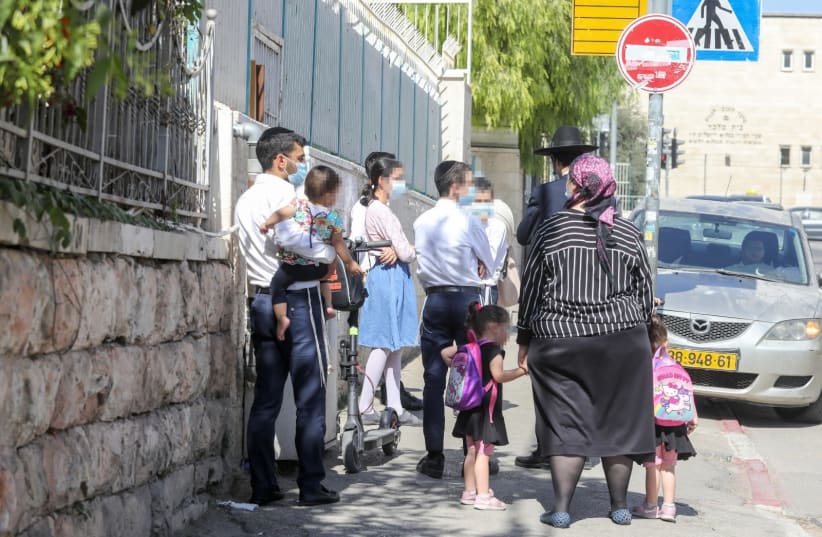Some 48% of couples stated that the pandemic impacted their quality time together and 14% of couples stated that the pandemic increased their desire to divorce while only 10% stated that it lowered their desire to divorce, according to the poll.
Some 23% of families reported that the coronavirus outbreak led them to seek help from outside sources for parenting and familial issues, three times as much as those who said they seeked help less.
Some 78% of parents who were fired or put on unpaid leave reported that their parental competence, meaning the ability to provide developmental and psychological needs, was unimpacted or even got better.
Some 34% of parents stated that they lost trust in teachers and the education system due to the coronavirus and 65% of parents reported that they felt they were only able to at most moderately help their children overcome crises caused by the coronavirus.
More than half of the respondents reported that a lack of caution concerning coronavirus prevention by one partner led to fights in the family.
Some 92% of grandparents expressed that they were sad about having free time that they couldn't spend with their grandchildren and about a quarter of grandchildren stated that they felt abandoned by their families in some way.
Family Day was originally Mother's Day and is celebrated on the date when Henrietta Szold, founder of Hadassah and a Zionist leader, passed away. Szold did not have any biological children, but she led an organization Youth Aliyah which rescued many Jewish children from Nazi Germany and championed children's rights.
A Family Day report by the Central Bureau of Statistics this week reported that in 2019, there were about 2.14 million families in Israel, compared to 1.8 million about a decade ago. On average, Israeli families include 3.72 people, which has not changed for the past decade.
About 29% of Jewish couples in Israel don't have children, while about 11% of Arab couples don't have children. About 11% of families with children under 17 are singly-parent families, with 88% of these families being headed by women.To mark the holiday this year, President Reuven Rivlin tweeted a picture of himself with his late wife Nechama, reading "Family, is sometimes longing. Happy Family Day my dear ones." The tweet also included the poem by Hedva Harechavi called "Like then, when there was a fear of a thin crack" about longing.
משפחה, היא לפעמים געגוע. יום המשפחה שמח יקיריי ויקירותיי.--שירה של חדווה הרכבי ״כמו אז, כשהיה חשש לסדק דק״. pic.twitter.com/Z9NdGLA09l
— ראובן (רובי) ריבלין (@ruvirivlin) February 12, 2021
The Academy of the Hebrew Language marked the holiday this year with a series of tweets about words related to family, expressing the various structures of modern families with a graphic borrowing the characters from the sitcom Modern Family. Descriptions of same-sex couples can become more complex in Hebrew due to the fact that words are gendered in Hebrew.
For example, the Academy explained that in same-sex couples, there is no grammatical issue with using the words "בעלו" ("Ba'alo" meaning "his husband") and "אשתה" ("Ishta" meaning "her wife"). The Academy also presented words for various other situations, including "הורים בשיתוף" ("Hori'im B'Shituf") to describe a man and woman not in a relationship who agree to raise children together and "יְחִידִיּוּת" ("Yehidiut") to describe singlehood, being single by choice.
דברים שאולי לא ידעתם על המשפחה שלכם:1️⃣ יום המשפחה, שנקרא בעבר "יום האם", מצוין בישראל ביום פטירתה של הנרייטה סאלד, "אם הילדים".2️⃣ צורת הנקבה של הוֹרֶה היא הוֹרָה, והיא אחת מצורות הבינוני של הפועל הָרָה שעניינו היריון. לכן דווקא צורת הנקבה היא הטבעית והמתבקשת ביותר. pic.twitter.com/jDlvnBnklZ
— האקדמיה ללשון העברית (@HebAcademy) February 12, 2021
For those who prefer to avoid using the word "בעל" ("Ba'al") commonly used to mean husband, but also the Hebrew word for "master," the Academy suggests "אישי" ("Ish'i"), "בן זוגי" ("Ben Zugi"), "רעי" ("Rei'i") or "זוגי" ("Zugi").
"It has been a challenging year for the whole family - pass this on to everyone and show them how much you love them!" tweeted the Academy.
The first Mother's Day celebration in Israel was initiated on April 6, 1947 by the Ezra society, a women's health organization led by Sarah Herzog, mother of former president Chaim Herzog and Mariana (Miriam) Hoofien, wife of the general manager of the Anglo-Palestine Bank (which later became Bank Leumi), according to Israel21C.
In 1951, Hannah Hushi, wife of Haifa mayor Abba Hushi, established a different Mother's Day for Haifa which was celebrated during Hannukah to link it to the Maccabean Hannah, who's seven sons were killed by the Greeks. The day was also linked to Tu B'Shvat. Later in the year, the newspaper Ha'aretz Shelanu declared its own Mother's Day intiative and asked readers to suggest a date, eventually settling on a date to honor Szold.
In the early 1970s, the Education Ministry adopted the holiday and set the date to the 30th of Shvat to mark the anniversary of Szold's death. In actuality, Szold passed away on the first of Adar, according to Israel21C.
In the late 1990s and early 2000's, the day began to change into Family Day, as the structure of family's became more varied. "The division of roles in the family has changed and has become more egalitarian," read a 2006 Education Ministry document outlining preschool activities to mark the holiday. "Mothers are a significant economic factor in the family, and fathers share the relationship with the children from the stage of pregnancy and take a large part in their education and growth. These changes led to a change in the essence of the special day and its transformation from Mother’s Day to Family Day."
The holiday is mostly celebrated within educational frameworks, with less public and commercial involvement than it has in some other countries.
